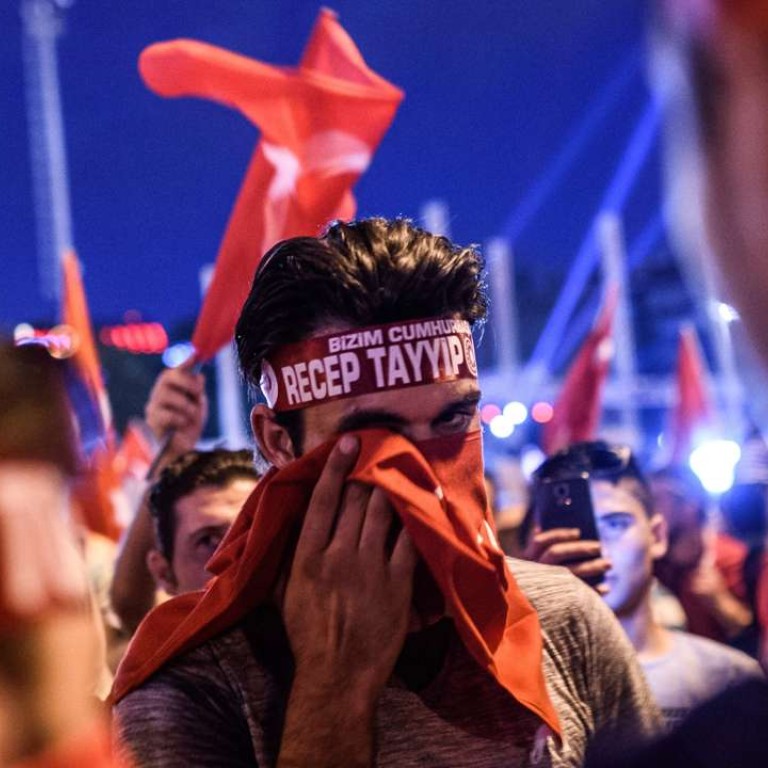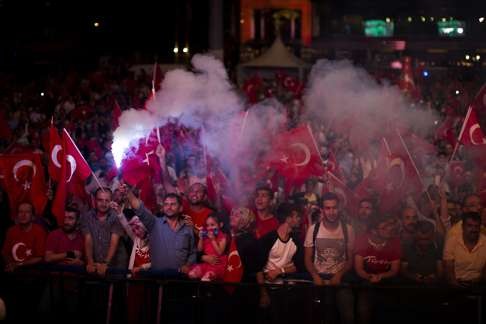
‘We see him as one of us’: why many Turks still support authoritarian Erdogan
For the thousands of Turks who gathered outside Istanbul’s city hall on Tuesday evening, one man loomed large. At the end of the street, a giant image of Recep Tayyip Erdogan, Turkey’s president, stared down on the crowds.
Summoned by a text message from the government, the crowds had gathered for what officials have called “Democracy Watch” – a public rejection of last week’s attempted coup, and a show of support for the status quo.
“We love our president so much,” said Ersin Korkmaz, a 29-year-old civil servant who was draped in a Turkish flag. “He’s our best leader since Mehmed the Conqueror,” Korkmaz added, referring to an Ottoman sultan who captured Constantinople in 1453.
Erdogan’s enduring popularity perplexes some western observers, who know him mainly for his increasingly authoritarian actions. In recent days, western leaders have expressed alarm at the purge instigated following the coup attempt.
Since Saturday about 35,000 officers, soldiers, policemen, judges, prosecutors, teachers and university deans have been detained, fired or suspended as Erdogan attempts to isolate anyone his government perceives to be a threat. But outside city hall the crowds saw him mainly as a saviour.

“Some people call him a dictator but those of us who saw the previous leaders know he isn’t,” said Adem Çankaya, a 42-year-old chauffeur. “And that’s why they vote for him. Till our last breath, we are here for Erdogan.”
The president’s backers often cite three main reasons for his popularity and that of his party, the AKP. The first is social: Erdogan is perceived as a man of the people, a representative of the lower and lower-middle classes.
“The entire AKP narrative is about the periphery taking control of the country from the elites who had been abusing state power, and [his supporters] see in Erdogan the impersonation of that narrative. In the past all the state institutions were felt to be anti-people. But now these institutions are their institutions,” said Asli Aydintasbas, Turkey analyst at the European Council for Foreign Relations.
Then there’s the religious aspect. Erdogan’s Islamist AKP represents the religiously conservative sections of Turkish society, that have felt sidelined since Mustafa Kemal Atatürk, the founder of modern Turkey, secularised the state in the 1920s.
“Before Erdogan, people were corrupted and deviant,” said Korkmaz, the flag-draped civil servant. “Thank god we are restoring things for a new generation.”

Finally, there’s the economics. Under Erdogan, people have become better off. Since gaining power in 2003, his government has made significant improvements to state infrastructure, building a long list of bridges, roads, and metro lines and beefing up the health-care system.
“We can see significant economic change from the time that Erdogan became president,” he said as a brass band began to play at the rally. “Health care, transportation, care of the elderly, and especially inflation. People feel more valued.”
Çankaya, the chauffeur, credited Erdogan with the change in treatment his poorly mother received at state hospitals. Racked with kidney disease, Çankaya’s mother did not receive proper treatment prior to Erdogan’s election, but after his reforms, Çankaya said, she was given three dialysis sessions a week free of charge.
Erdogan’s supporters are able to swallow his authoritarianism partly because they feel it is justified, argued Soner Çagaptay, the author of The Rise of Turkey.
Using what Çagaptay calls an “authoritarian underdog strategy”, Erdogan portrays every crackdown on the opposition as legitimate responses to threats to remove him from power.

“Every time there is opposition to Erdogan, it’s cast as a conspiracy to overthrow him,” said Çagaptay. “And so it becomes justified in the eyes of his followers.”
In recent years, Erdogan and his allies have been dogged by corruption allegations. But once again his supporters have been prepared to turn a blind eye.
“What the AKP base felt was that they may have taken money but they’re improving my life,” Aydintasbas said. “There is a cultural element that is very hard for outsiders to grasp. He represents Sunni Turkey, and an identity that had been sidelined from power for many years.”
Could Erdogan lose popularity in the short term? Many find it hard to imagine, unless the economy suddenly tanks or Turkey’s listless main opposition party finds better leadership. Çagaptay says divisions will now only widen between the half of the country that votes for the AKP and the half that doesn’t.
While a wide coalition of Turks opposed the recent coup attempt, the ongoing purge will cause Turkey to polarise even further, he says. “Those who liked Erdogan and who didn’t will descend into those who adore him and those who hate him.”

